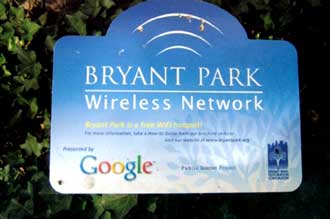Consultant: Free Muni WiFi is not always the best choice


Author of "Fighting The Good Fight for Municipal Wireless," Craig Settles is an authority on the issue.
In his latest Web-posted excerpt, "What's The Price of 'Free,'" Craig uses interviews with more than a dozen city officials, consultants and vendors to document his view that free municipal wireless should not necessarily be the ultimate goal of every municipality.
"In listening to the people I surveyed, I was struck by how limiting many of the discussions about municipal wireless have become," he writes, "Everything has boiled down to 1) such-and-such city is getting it free, 2) the vendor is going to own the network and 3) there’s the ad-model or the subscription model. "Yankee ingenuity, as we Americans used to call our brand of creativity back in the days of black and white TV, is taking a big hit in the era of municipal wireless."
Rather than engage in this municipal me-tooism, Craig suggests that cities engage in a thought process that involves an honest assesment of who would be served by this network, and what are the limitations that would be involved in making it work. He suggeswts that this dialog should take place within munipal departments, as well as between non-profit groups, the private sector, and other government organizations.
Craig makes the point for broad thinking, in terms of service model, technology and possible business partners:
In discussion groups, test drive every business model concept since Cro-Magnon man and woman contemplated bartering. See a concept that might gain traction, pull it out and kick it around. The same with potential partners. Don’t fixate on the typical ISPs, any business any industry is a candidate. Look at the sponsorship option. You have a city with “x” thousand or million citizens. That population is an asset. Companies will spend a gezillion dollars for the right kind of access to the right kind of audience.
Craig then pushes twin notions that on superficial first blush, sound counterintuitive. WiFi might not be the best choice in all cases, and as appealing as it is, free WiFi can underserve your citizenry.
You need to push the envelope with technology choices as well, though you’ll likely need to bring in some systems integrator or other technology expert to help out. The goal here is low-cost high speed Internet access. WiFi is means to reaching this goal, but it’s not the only means. Every city is different, so that means the combination of buttons they need to push should be different. Expand your options.
And as to free WiFi:
I have to say that the frenzied focus on trying to get municipal wireless free is detrimental to the advancement of this trend, and it is putting cities in danger of missing the many opportunities the technology offers. Trying to get the best deal possible for a city and its citizens should always be the main goal, though. You do this through better planning, thorough assessment of your technology and end user needs and a more aggressive exploration of your options.
Craig then backs up his view with some cold hard facts of life:
If you do decide that some type of free access service or free network buildout is in the best interest of your city, you can’t give the vendor a free ride to build and run the network without city participation in some form of active partnership. Not if you expect the network to have any meaningful impact. Even if it’s purely a public access network, supportive involvement by the government will help ensure enough people sign up.
Affordability is going to be a constant factor cities need to address as they work to get their projects under way. However, they can’t automatically default to the seemingly easiest and/or cheapest way to put networks in place. To do so is to risk long-term benefits.
I think Craig has some valid points. Let me ask you readers: how would you like to see your city go with regard to municipal WiFi? Post a TalkBack and let us know.